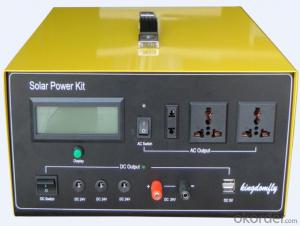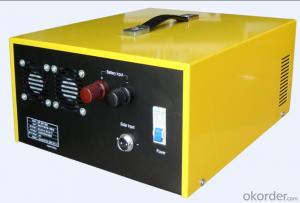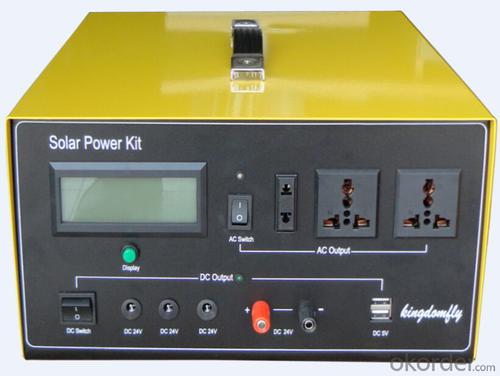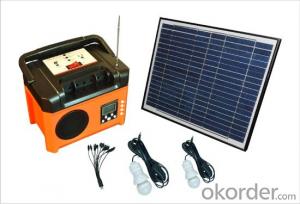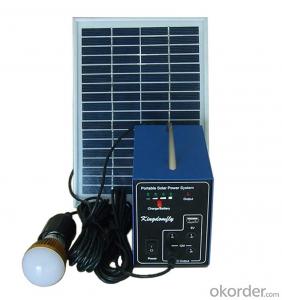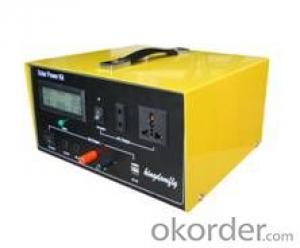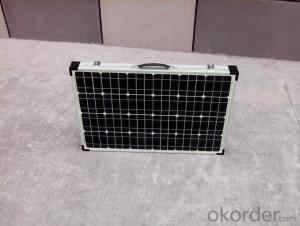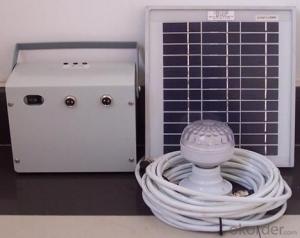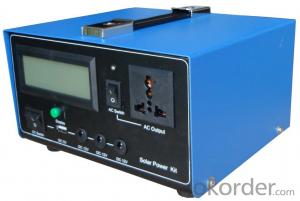Solar Energy Systems Indiana - Home Solar Power System SPK_1000
- Loading Port:
- China main port
- Payment Terms:
- TT OR LC
- Min Order Qty:
- 3 pc
- Supply Capability:
- 10000 pc/month
OKorder Service Pledge
OKorder Financial Service
You Might Also Like
Main Information
KDF SPK_1000 This product is high performance,family used portable solar power system,which can receive energy and store it in battery outside connected to SPK by solar energy on sunny day,and supplies electric power for varies appliances such as electric fan,lighting lamps, television, portable computer etc.It can supply power for both DC and AC electric application .It’s very helpful and useful for home electric supply.
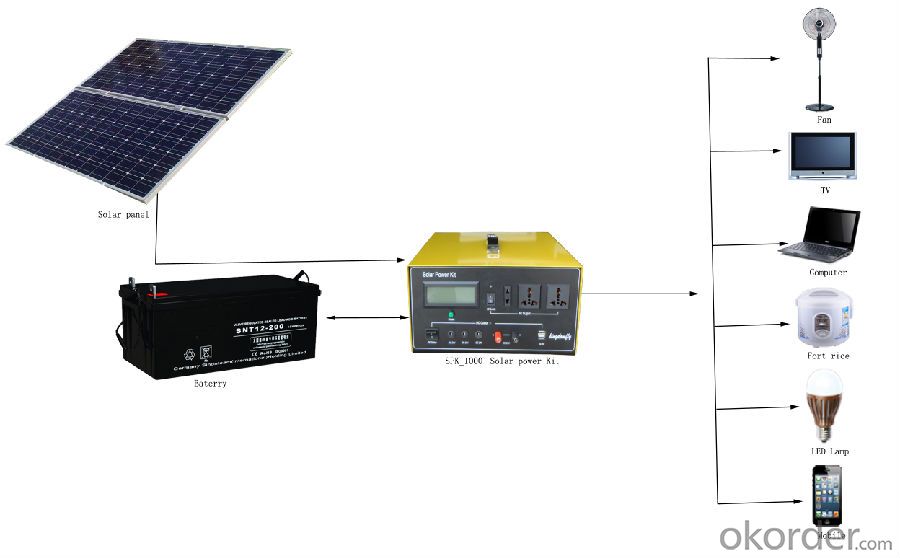
Features:
◆ Battery puts outside connected to the SPK for user to choose battery in recommended range, and easily to exchange battery.
◆ Both DC and AC output
◆ Solar Feedback Circuit Protection
◆ Output Short-circuit Protection
◆ Solar「+」「-」anti-access protection
◆ Output「+」「-」anti-access protection
◆ Over Charged Protection
◆ Over Discharged Protection
◆ Over Load Protection
◆ Over-Temperature Protection
Technical parameters
Specification | Value/Material | |
Item No. KDF | SPK_1000 | |
Solar Recommended | Specification | Poly silicon |
Working Voltage/Power | 36V/80W~500W | |
Battery Recommended | Rated Voltage/Capacity | 24V50AH~200AH |
Cycle Number | 80% Deep Cycle Number:500 70% Cycle Number:800 | |
Working Temperature | Short Period(one Month):-20~50℃Long Period(Six Months):-10~45℃ | |
Charging Controller | Operating Voltage | 24V |
Input Voltage | 34.6V~42V | |
Input current | MAX:20A | |
Power Consumption | MAX: 15mA | |
Low Voltage Disconnect(LVD) | 21.6V | |
Low Voltage Reconnect(LVR) | 24.6V | |
High Voltage Discharge( HVC) | 29.2V | |
High Voltage Recharge(HVR) | 27.6V | |
Temperature Protection | 60℃ | |
DC Output | DC output & Application | USB 5V2A |
DC output & Application | DC 24V | |
AC Output | Output Wave | Modified sine wave |
Input Voltage | 22V~30V | |
Output Voltage | 220V±10% | |
Output Frequency | 60Hz±2Hz/50Hz±2Hz | |
Rated Output Power | 1000W | |
Maximum VA | 2000VA | |
Maximum Efficiency | 88% | |
Temperature | 0-40℃ | |
Over Temperature | 60℃~70℃ | |
Low Voltage Alarm | 22V | |
Low Voltage Shut off | 21V | |
High Voltage Shut off | 30V | |
Package | Set size | 350*449*227mm |
Set N·W | 7.2kg | |
Set N·W | 5.2kg | |
LCD_Display
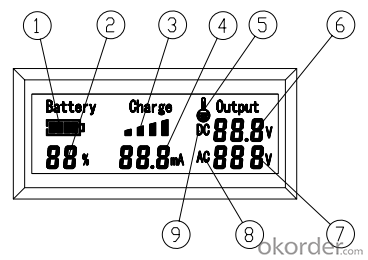
No. | Name | Function |
1 | Battery Icon | To show the Volume of the Battery |
2 | Date of % | To show the percent of the Battery |
3 | Charging Icon | To show the charging condition |
4 | Current | To show the value of charge current |
5 | Temperature Icon | Temperature Alarm |
6 | Date of Voltage | To Show the Value of DC output voltage |
7 | Date of Voltage | To Show the Value of AC output voltage |
8 | AC Icon | AC output |
9 | DC Icon | DC output |
- Q: Can solar energy systems be used for water heating in swimming pools or hot tubs?
- Yes, solar energy systems can be used for water heating in swimming pools or hot tubs. Solar thermal collectors are commonly employed to capture sunlight and convert it into heat, which can then be transferred to the water in pools or hot tubs. This eco-friendly and cost-effective method can significantly reduce the energy consumption associated with heating water for recreational purposes.
- Q: Can solar energy systems be used for powering electronic devices?
- Yes, solar energy systems can be used to power electronic devices. Solar panels can convert sunlight into electricity, which can then be used to charge and power various electronic devices such as smartphones, laptops, and even larger appliances like refrigerators and air conditioners.
- Q: Can a solar energy system be used in areas prone to earthquakes?
- Yes, a solar energy system can be used in areas prone to earthquakes. Solar panels are designed to withstand various environmental conditions, including seismic activity. The mounting systems used for solar panels are typically engineered to meet specific building codes and standards, ensuring they can withstand earthquakes. Additionally, solar panels do not require any moving parts, making them less susceptible to damage during seismic events. However, it is important to note that the installation and design of the solar energy system should adhere to local regulations and building codes to ensure that it can withstand earthquakes effectively.
- Q: Are there any risks of electrical shocks during installation or maintenance of solar energy systems?
- Yes, there are risks of electrical shocks during the installation or maintenance of solar energy systems. These risks can occur due to the high voltage of the system, improper grounding, faulty wiring, or inadequate safety precautions. It is crucial to follow proper safety procedures, use appropriate personal protective equipment, and ensure that qualified professionals handle the installation and maintenance to minimize the risk of electrical shocks.
- Q: What are the benefits of installing a solar energy system?
- Installing a solar energy system comes with numerous benefits that make it a compelling choice for individuals, businesses, and communities. First and foremost, solar energy is a renewable and sustainable source of power. Unlike fossil fuels, which are finite and contribute to environmental degradation, solar energy harnesses the power of the sun, which will continue to shine for billions of years. One of the key advantages of solar energy is its ability to reduce electricity bills. By generating your own electricity, you can significantly lower or even eliminate your reliance on grid power, resulting in substantial savings over time. Moreover, solar panels have a long lifespan, typically lasting 25 to 30 years, meaning you can enjoy these cost savings for decades. Not only does solar energy save money, but it also provides a stable and predictable energy cost. As utility prices fluctuate due to various factors, solar energy allows you to lock in your electricity costs and protect yourself from future price increases. This stability can be particularly beneficial for businesses and organizations that need to manage their budgets effectively. Installing a solar energy system also helps to reduce carbon emissions and combat climate change. Solar power is a clean and green energy source that produces no greenhouse gases or air pollutants during operation. By transitioning to solar energy, you can decrease your carbon footprint and contribute to a cleaner and healthier environment for future generations. Furthermore, solar energy systems require minimal maintenance. Once installed, solar panels generally require only occasional cleaning and inspections, making them a hassle-free and low-maintenance energy solution. They also provide energy independence, allowing you to generate your own power and become less reliant on external energy sources. In addition to these benefits, installing solar energy systems can also lead to job creation and economic growth. The solar industry has been rapidly expanding, creating new employment opportunities and contributing to local economies. Investing in solar energy not only benefits the environment but also stimulates economic development and supports the growth of a sustainable and resilient energy sector. Overall, the benefits of installing a solar energy system are vast and multi-faceted. From cost savings and energy independence to environmental sustainability and job creation, solar power offers a compelling solution for a brighter and more sustainable future.
- Q: Can solar energy systems be used in areas with high levels of natural disasters?
- Yes, solar energy systems can be used in areas with high levels of natural disasters. In fact, solar energy systems can be particularly beneficial in such areas. Unlike traditional power grids that are vulnerable to damage from natural disasters, solar energy systems are decentralized and can be installed on rooftops or in small arrays, making them more resilient to disruptions caused by events like hurricanes, earthquakes, or floods. In areas prone to hurricanes or severe storms, solar panels can be installed using hurricane-resistant mounts and brackets to withstand high winds. Additionally, solar panels are designed to be durable and can withstand hail, thus minimizing damage during extreme weather events. In areas susceptible to earthquakes, solar energy systems can be installed with reinforced mounting systems and structural enhancements to ensure stability during seismic activity. Moreover, solar panels are typically lightweight and flexible, reducing the risk of structural damage compared to other infrastructure. In flood-prone regions, solar panels can be elevated or installed on floating platforms to prevent damage and maintain functionality during periods of high water levels. Furthermore, solar energy systems can provide a reliable source of power when conventional power grids are disrupted due to flooding. Moreover, solar energy systems can help communities recover more quickly after a natural disaster. By generating electricity locally, solar panels can power critical infrastructure such as emergency shelters, hospitals, and communication systems, thereby ensuring continuity of essential services during and after a disaster. Overall, solar energy systems offer unique advantages in areas with high levels of natural disasters. Their decentralized nature, durability, and ability to provide reliable power make them a viable and resilient solution for meeting energy needs in such regions.
- Q: Can solar energy systems be used in areas with frequent lightning strikes?
- Yes, solar energy systems can be used in areas with frequent lightning strikes. While lightning strikes can pose a risk to any electrical system, including solar panels, there are measures in place to mitigate this risk. Solar panels are designed to withstand various weather conditions, including lightning strikes. They are built to be durable and capable of handling external stressors, such as electrical surges caused by lightning. Additionally, solar panels are grounded using lightning protection systems to divert the electrical charge safely into the ground, reducing the risk of damage to the system. Furthermore, solar energy systems typically include surge protection devices and lightning arresters that help dissipate and redirect electrical surges caused by lightning strikes. These protective measures help safeguard the system and prevent any potential damage. It is important to note that while solar energy systems can generally withstand lightning strikes, it is still recommended to consult with a professional installer and follow local electrical codes and regulations to ensure proper installation and protection against lightning strikes.
- Q: Can a solar energy system be installed in an apartment or rental property?
- Yes, a solar energy system can be installed in an apartment or rental property. However, the installation process may vary depending on the building's structure and landlord's permission. Renters can explore options like community solar programs, portable solar panels, or negotiating with their landlord for a solar installation.
- Q: What is the lifespan of solar batteries?
- The lifespan of solar batteries can vary depending on several factors. Generally, high-quality solar batteries can last anywhere from 5 to 15 years. However, with proper maintenance and care, some batteries have been known to last up to 20 years or more. The lifespan of solar batteries is influenced by factors such as the type and quality of the battery, the depth of discharge (how much energy is used before recharging), the frequency of charging and discharging cycles, and the overall maintenance of the battery system. It's important to note that over time, the capacity of solar batteries may decrease, resulting in reduced energy storage capabilities. This gradual decline in capacity is known as battery degradation. While it is an inevitable process, proper care and maintenance can help slow down the rate of degradation. Regularly monitoring the battery's state of charge, avoiding deep discharges, and ensuring proper ventilation and temperature control can all contribute to prolonging the lifespan of solar batteries. Additionally, following the manufacturer's guidelines for maintenance and replacement can help maximize their longevity. Overall, investing in high-quality solar batteries, coupled with proactive maintenance, can significantly extend their lifespan, providing reliable and sustainable energy storage for your solar power system.
- Q: How do solar energy systems impact the overall sustainability of a home?
- Solar energy systems have a significant impact on the overall sustainability of a home. Firstly, they greatly reduce dependence on fossil fuels, which are finite and contribute to climate change. By harnessing the power of the sun, solar energy systems generate clean, renewable electricity that doesn't produce harmful emissions or pollutants. This not only helps to mitigate climate change but also improves air quality in the surrounding environment. Furthermore, solar energy systems provide homeowners with energy independence and resilience. By generating their own electricity, homeowners can reduce their reliance on the grid and avoid the volatility of energy prices. This can lead to long-term cost savings and greater financial stability. Additionally, during power outages or natural disasters, solar energy systems with battery storage can provide a reliable source of electricity, ensuring essential appliances and systems keep running. Solar energy systems also increase the energy efficiency of a home. By supplementing or replacing traditional energy sources, these systems reduce the overall energy consumption of a household. This, in turn, lowers utility bills and conserves resources. Moreover, the installation of solar panels can increase the value of a home. As renewable energy becomes more popular and desirable, potential homebuyers are increasingly willing to pay a premium for properties with solar energy systems. This not only benefits homeowners who are looking to sell their homes but also contributes to the overall growth and adoption of sustainable energy solutions. Lastly, solar energy systems promote a sense of environmental stewardship and sustainability. By utilizing renewable energy, homeowners can actively contribute to reducing their carbon footprint and preserving the planet for future generations. This commitment to sustainability extends beyond the household, inspiring others to embrace clean energy and work towards a greener future. In conclusion, solar energy systems have a positive and far-reaching impact on the overall sustainability of a home. They reduce dependence on fossil fuels, increase energy efficiency, provide energy independence and resilience, boost property value, and promote environmental stewardship. By harnessing the power of the sun, solar energy systems pave the way for a more sustainable and resilient future.
Send your message to us
Solar Energy Systems Indiana - Home Solar Power System SPK_1000
- Loading Port:
- China main port
- Payment Terms:
- TT OR LC
- Min Order Qty:
- 3 pc
- Supply Capability:
- 10000 pc/month
OKorder Service Pledge
OKorder Financial Service
Similar products
Hot products
Hot Searches
Related keywords
